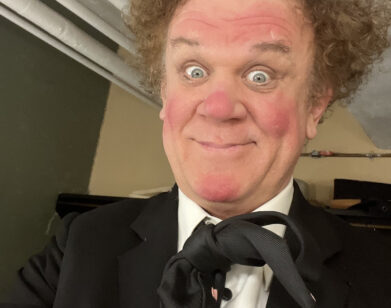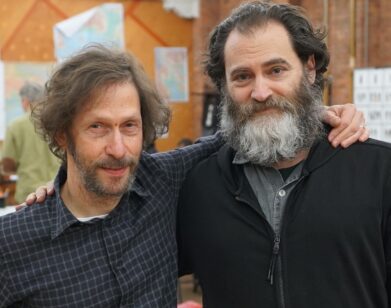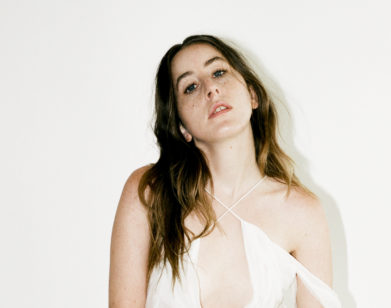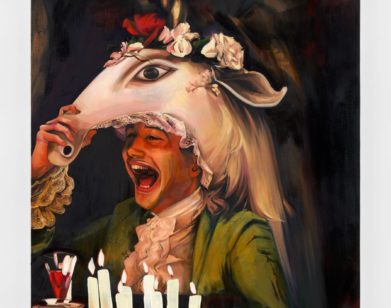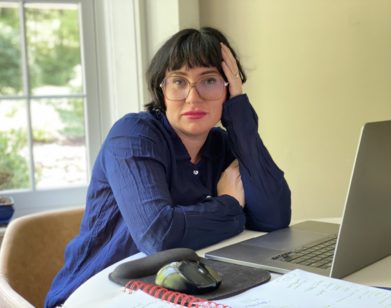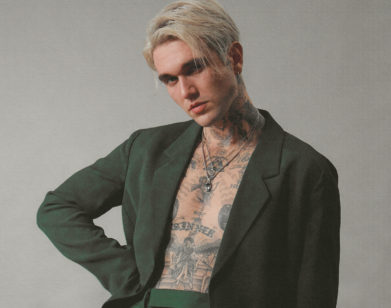It’s Vicky Krieps, not Daniel Day-Lewis, who is the real star of Phantom Thread
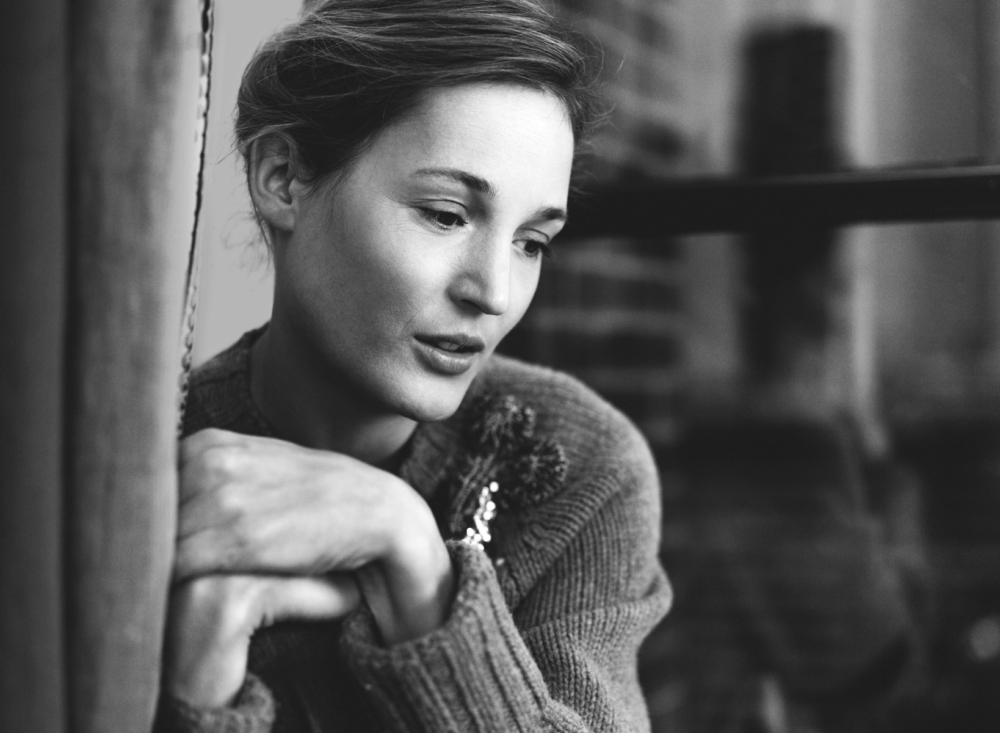
Phantom Thread, the new film from Paul Thomas Anderson, garnered extra attention when its star, Daniel Day-Lewis, announced that it would feature his final performance. But somewhat miraculously, it isn’t the three-time Oscar winner’s portrayal of the obsessive dressmaker Reynolds Woodcock that you’ll be talking about when you leave the theater. The movie belongs to Vicky Krieps, a previously unknown actress from Luxembourg, who Anderson cast after stumbling on her performance in a 2014 German drama called The Chambermaid.
Krieps, in her first starring English-language role, plays Alma, a demure waitress who catches Woodcock’s eye while having breakfast during a country retreat. Drawn to her, he asks her to dinner, and then hastily weaves her into the tapestry of his entire life, including his work. She becomes his muse, his lover, his companion, and his obsession. Initially shy and somewhat passive, Alma reveals herself to be something else entirely, headstrong woman who has her own designs on this courtship. As the intricately made movie charts their complicated relationship, and their subsequent battle for dominance over one another, Krieps gives an astonishingly controlled performance, and by the movie’s twisted final act, the balance of power is firmly tilted in her direction.
I met Krieps earlier this week at the Crosby Hotel in Manhattan, where she was finishing up her fourth photo shoot of the day. It’s part of a new reality that she is slowly and somewhat grudgingly adjusting to. As a working actress in the small European film industry, Krieps was able to focus on the work. But now she’s trying to figure out how to concentrate on acting and avoid the spotlight that comes with being anointedHollywood’s Next Big Thing.
BENJAMIN BARNA: You had the movie’s premiere last night. Have you gotten used to accepting so many compliments?
VICKY KRIEPS: Not so many people come to me, and I don’t know what it is, so that’s one thing. The other one is that I’m just always happy that they see the work and the film, because I really like the film.
BARNA: How many times have you watched it?
KRIEPS: Oh many times. I made the dubbing for French and the dubbing for German so that makes you watch scene by scene by scene over and over again, so I think I’m an expert on it now. [laughs]
BARNA: A lot of people are referring to you as a discovery or a find. Do you feel like you’ve been discovered or found by Paul Thomas Anderson?
KRIEPS: Yes and no. I do feel that, I myself wouldn’t have had, in my life looking back, the courage to go out and say, I’m a good actress. So I think I’m one of those people that needed to be seen by someone else to see myself. But then on the other hand, the way I do my work, I always try to only completely focus on my work, so when I do my work I’m only interested in my character. So I don’t have an idea of what it means for my career. So this is why I don’t feel like I need to be discovered, because I feel like even without being discovered, I will be fine.
BARNA: Have you been enjoying doing all the publicity that comes with a movie like this?
KRIEPS: It’s cool, because it’s a movie that I could talk about for days. And when I realize that people really take the time to see what I did, this makes me happy, and I enjoy it. I don’t really enjoy being the center of attention, I find it hard. I think it’s the celebrity culture you guys have over here, which we don’t have so much, and if we have it I blend it out. I’ve been very successful by just blending it out, by not going to premieres and things. So if I’m invited to a premiere, I would go behind the photo screen, because why would I get my photo taken? I just don’t see the point of myself being photographed. I’m not like this because I think I’m too cool. I’m like this because I don’t understand it. I’m not judging it, it’s just not my thing.
BARNA: This is your first major American role, but it doesn’t feel like a typical American film at all. It has more in common with a European art film. Did that make you more comfortable?
KRIEPS: Yeah, for me it felt completely like how we do movies. There was a Q&A where they were talking about how it was so small in the house where we filmed, and there was no space. That’s how we always work. For me it was completely normal. We don’t have these big studios, so we always work in real places and we have to deal with the place, and the owner of the place, and the rent and all this shit, so I really knew it well. That was where I was lucky. I think it would’ve been weirder going to do this American studio film, and then I would’ve realized what I was actually part of. I’m only realizing now while I do press that I’m part of this American Hollywood movie. I only find out now, because I have people come to me and say, “How is it to be in this Hollywood movie?”
BARNA: Were you aware of the mystique surrounding Daniel Day-Lewis and the way he works?
KRIEPS: Not so much as people here, because again, we don’t have this celebrity culture. I knew all of his characters. When I knew it was him, I looked up Daniel Day-Lewis and of course saw he’s this famous actor that everyone says is so great. I realized that I’d seen all of his roles and that they have had a huge impact on me. I didn’t know this was all the same man. I then decided, knowing that I would be encountering one of the greatest actors of all time, that I would try and forget. I knew that was my only way to go. I could forget who he was, forget what people say about him, forget what they say about method acting, forget about Hollywood, almost forget about acting and filmmaking, because I wanted to be this open-hearted, genuine, and very pure person, so I could meet him person to person, not meet him as an actress meeting Daniel Day-Lewis.
BARNA: When you first met Reynolds Woodcock, are you in character as Alma?
KRIEPS: I don’t call myself a method actor, but the thing is, when you meet Reynolds Woodcock, who is always Reynolds Woodcock, you kind of are Alma and you kind of become Alma all the time. I think after the first day, Vicky was going, “Oh gosh.” It was so intense, and I couldn’t understand why it was so intense. I remember after the second day of shooting, we were still shooting and he would bring me home—he would bring Alma home—and every time I closed the door, I would go, “Please not again, please not again.” I didn’t know where it came from and I didn’t know what it was relating to, but it was just me thinking, this is too much.
BARNA: What was too much?
KRIEPS: Just being with him was so much work, and I don’t know how to say this, because he’s so intense and so demanding as Reynolds. And Daniel disappears as Reynolds, so at first when you don’t know what’s going on, it’s so intense, and it’s a lot to take.
BARNA: Does it make sense to you why he’s retiring? If it was exhausting being around him, then it must be exhausting just being him.
KRIEPS: I certainly hope that he’s wrong about this, and I certainly think that if it was me saying something like this after a movie, I wouldn’t trust myself. You’re always very vulnerable and open after doing a movie like this. It’s funny that the whole of America takes his word after he makes this movie, but on the other hand, he’s a serious person, so if it is what he wants to do, I think it’s very right of him to say so. I admire him for it, or people who are able to speak their mind and make a decision. Nowadays everyone is trying to live up to the expectations of their surroundings, especially in the industry they work for, and I think that we forget that we also can decide and just say, I’m ending it because I want to.
BARNA: Did you understand Alma from the first time you read the script, or did it take time to unpack her through conversations with Paul?
KRIEPS: Well, speaking with Paul I quickly understood that he is writing intuitively. He’s someone who knows so much, he reads so much, he’s just full of knowledge, but still trying to be intuitive and open to inspiration. So meeting him I knew he wouldn’t be the person who gave me all of the answers. He’s not interested in answers, and I’m not interested in answers either. I think we are really alike in our approach to art being more like a journey—it’s not about the final product, but the process. So all of the things I didn’t understand I just trusted my instinct that I would find a way emotionally to understand it, especially how their relationship grows.
BARNA: Did the ending of the film come as a shock to you?
KRIEPS: It kind of seemed logical without being logical. Reading Paul’s script was like watching a Hitchcock movie. I just accepted it from the moment I met him without understanding it. So I wouldn’t say I understood it, but I had to find my way there.
BARNA: Working with Paul, can you see why he’s considered to be one of the greatest filmmakers of this generation?
KRIEPS: Oh, absolutely.
BARNA: What are some of the things that give that away?
KRIEPS: He trusts you. If he chooses you as an actor he trusts you to be the best person to speak for the character. He’s not coming up and telling you, “Oh, I think the character should do this or that.” No, he’ll come and ask you what you think Alma should be doing and he respects this completely. On the other hand, he’s very aware of what he needs for his film, actually making the movie and editing it. He changed a lot of things in the editing, and it’s there I understood just how brilliant he is, by what he’s changing. If he changes it then he must’ve known that somehow it was always a possibility, so that’s the reason why he set it up that certain way.
BARNA: So he’s doing things on set that he’s aware of but that you’re not aware that he’s aware of, right?
KRIEPS: Kind of, yes. Then sometimes he leaves you to do stuff that I’m aware of but he’s not aware of. This takes so much courage, you know? And I find what’s so brave about this movie is that it’s not spectacular, it’s not trying to sell you something, it’s not trying to scare you, it’s not trying to make you feel good, it’s not trying anything. It’s just there, quite honestly and openly speaking about two people who are a couple, and I’ve never seen anything so honest. What they do together, it really feels like somebody opened this private door and it’s ready to be ugly, it’s ready to be not nice. The characters are embracing their ugly side, and I find it very brave nowadays where everyone is doing things for people to like it.
BARNA: Have you begun to think about how this movie will affect your career in terms of all the new opportunities it will bring?
KRIEPS: I’m trying not to think about it because it is scary.
BARNA: Have you sensed it changing?
KRIEPS: I’ve sensed it because people like you tell me that this is what’s going to happen, or people will look at me a certain way and say, “You will have a lot of work.” Or some people even without words, they just look at me. So it’s weird and I’ve tried to not think about it and I’m just going back home for Christmas. Nothing to do with here. I need this.

